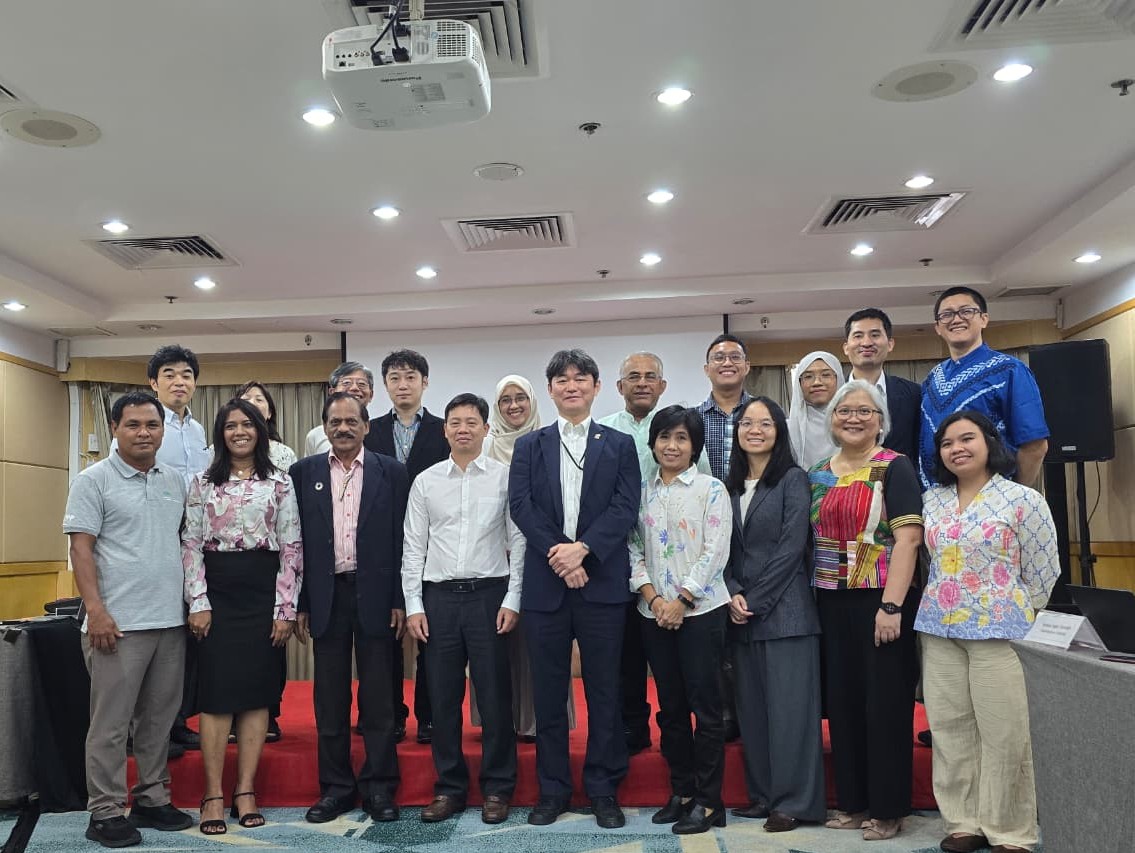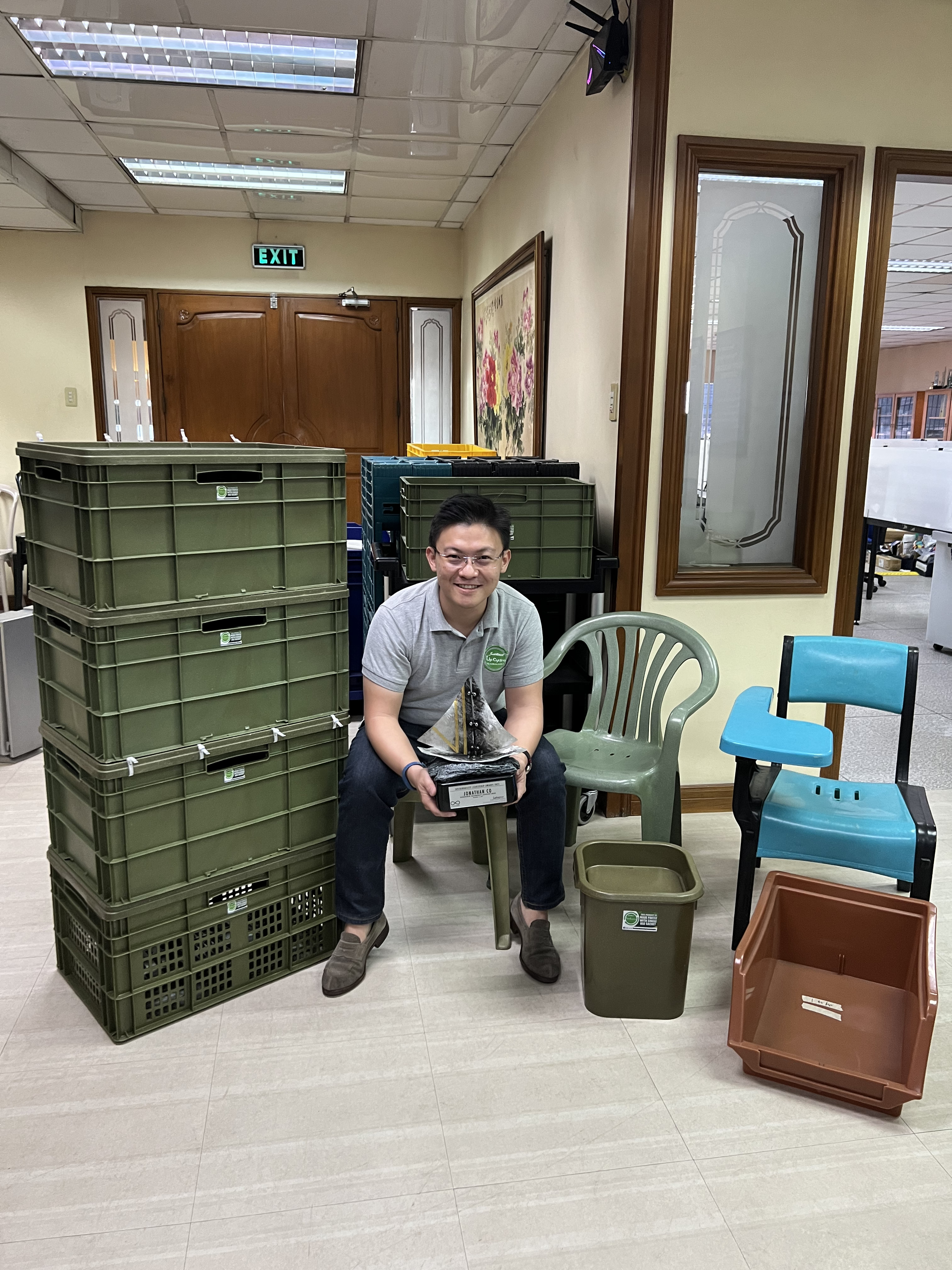

Hanoi, 25–26 September 2025: ERIA’s Regional Knowledge Centre for Marine Plastic Debris, in collaboration with the Institute for Global Environmental Strategies (IGES), co-hosted the eighth meeting of ERIA’s Experts Working Group (EWG) on Marine Plastic Debris in Hanoi, Viet Nam. The meeting featured discussions on several key topics, including updates on both organisations’ ongoing and future activities, and the latest scientific advancements on plastic pollution.
Mr Reo Kawamura, Director for ERIA’s Regional Knowledge Centre, and Dr Atsushi Watabe, Acting Programme Manager at IGES, welcomed all the experts who were present online and in-person by highlighting the meeting as a platform for knowledge-sharing, reinforcing the importance of collaborative actions.
The first part of the meeting focused on activities updates from ERIA’s Regional Knowledge Centre. Mr Kawamura shared the progress of the ASEAN Book Project, noting that the final draft had been agreed upon amongst the authors the day before the meeting. Intended as a resource for researchers, policymakers, and relevant stakeholders on plastic pollution in the ASEAN region, the book is expected to be published later this year following the ERIA’s team editing and publishing process.
Mr Fusanori Iwasaki, Research Fellow at ERIA, presented the upcoming Extended Producer Responsibility (EPR) Consumer Survey across five ASEAN countries – Indonesia, Malaysia, Thailand, the Philippines, and Viet Nam. The survey aims to assess consumer preferences on EPR attributes such as fee structures and revenue allocation. The findings will offer evidence-based guidance for designing effective and publicly acceptable EPR policies, particularly as Southeast Asian countries currently differ in their readiness to adopt such schemes.
Another ERIA project presented during the meeting was the Comparison of Waste Management Practices at Local Levels in Indonesia: A Behavioural Insight Analysis, delivered by Ms Aulia Salsabella Suwarno, Research Associate at the Regional Knowledge Centre. The study aims to build on success stories from two municipalities in Indonesia that have transformed community behaviour in waste management. Using a combination of questionnaires, in-depth interviews, and field observations, the project aims to provide comprehensive analysis of key lessons learned, especially regarding the behavioural motivations behind the change.
The meeting included discussions on the August 2025 meeting on global plastics treaty in Geneva – the second part of the fifth session of the Intergovernmental Negotiating Committee (INC5.2) – which ended without an agreement.
Mr Iwasaki emphasised Southeast Asia’s key role in the negotiations and proposed an EWG policy brief to support regional coordination. Ms Chika Aoki-Suzuki, Principal Policy Researcher at IGES, followed with a report on the situation and dynamics at INC5.2. She highlighted that the lack of common understanding of key concepts and definitions was a major factor behind the failure to reach consensus.
Prof. Agamuthu Pariatamby from the Jeffrey Sachs Center on Sustainable Development at Sunway University, Malaysia, shared his research on microplastics. He noted their presence in bottled water, fish, rainwater, and even beer – raising concerns about bioaccumulation and human exposure. He also presented his work on plastic leakage, using satellite-linked bottles to track movement, with many travelling as far as Africa and other continents. Dr Muhammad Reza Cordova, Researcher at the Indonesian National Research and Innovation Agency (BRIN), reported that his research on plastic monitoring showed similar findings. He stressed the importance of studying not only horizontal but also vertical movements of waste in the ocean in future research.
Prof. Chettiyappan Visvanathan from the Asian Institute of Technology, Thailand, outlined the status of the circular economy in Southeast Asia. He classified Singapore, Malaysia, and Thailand as ‘advancers’; Viet Nam, Indonesia, and the Philippines as ‘intermediates’; and others as still in the early stage. He noted sectoral challenges and opportunities, stressing the need for stronger cross-sectoral linkages and context-specific approaches.
Dr Cordova continued with a presentation on plastic leakage in Indonesia. From 2018 to 2023, plastic leakage into the ocean decreased by 41%, but overall accumulation of plastic waste continued to rise. Leakage typically originates from land-based activities, passes through rivers, and accumulates along Indonesia’s coastline, with distribution influenced by population density, industry, and seasonal factor. He also highlighted the clear correlation between waste collection rates and the amount of waste observed along riverbanks.
The first day concluded with IGES presenting its research plans. The team outlined operational priorities for the EWG, emphasising the need for concrete deliverables. IGES also announced plans to contribute to regional and international processes through policy briefs, joint statements, and other knowledge products. Upcoming research projects will focus on macro- and microplastic pollution in agriculture, abandoned or lost fishing gear (ALDFG), and integrated upstream–downstream approaches for single-use plastics (SUP).
The second day kicked off with a presentation by Dr Vu Dinh Hieu from the Vietnam Environmental and Marine Sciences Institute, who pointed the urgency of database and scientific advancement in plastic pollution policy. Dr Vu identified fragmented data, weak R&D capacity, market barriers, and overlapping ministerial responsibilities as key challenges. He underscored the importance of building a credible national database, investing in research, developing evidence-based policies, linking science with economic incentives, and enhancing inter-sectoral and international cooperation.
Throughout the meeting, experts actively engaged in discussions, sharing insights from their respective fields as well as experiences from their countries. The collaborative approach highlighted the importance of cross-country learning and knowledge-sharing in driving effective and science-based solutions.
In their closing remarks, Mr Kawamura from ERIA and Mr Yasuhiko Hotta, Research Director at IGES, expressed their gratitude for the substantial discussions and hoped that the collaborative work could provide valuable insights into ongoing efforts and future strategies for addressing marine plastic pollution in the ASEAN+3 region.
The agenda concluded with a site visit to AEON MALL Long Bien, Hanoi, where the experts had the opportunity to further exchange ideas with private sector actors.
Hanoi, 25–26 September 2025: ERIA’s Regional Knowledge Centre for Marine Plastic Debris, in collaboration with the Institute for Global Environmental Strategies (IGES), co-hosted the eighth meeting of ERIA’s Experts Working Group (EWG) on Marine Plastic Debris in Hanoi, Viet Nam. The meeting featured discussions on several key topics, including updates on both organisations’ ongoing and future activities, and the latest scientific advancements on plastic pollution.
Mr Reo Kawamura, Director for ERIA’s Regional Knowledge Centre, and Dr Atsushi Watabe, Acting Programme Manager at IGES, welcomed all the experts who were present online and in-person by highlighting the meeting as a platform for knowledge-sharing, reinforcing the importance of collaborative actions.
The first part of the meeting focused on activities updates from ERIA’s Regional Knowledge Centre. Mr Kawamura shared the progress of the ASEAN Book Project, noting that the final draft had been agreed upon amongst the authors the day before the meeting. Intended as a resource for researchers, policymakers, and relevant stakeholders on plastic pollution in the ASEAN region, the book is expected to be published later this year following the ERIA’s team editing and publishing process.
Mr Fusanori Iwasaki, Research Fellow at ERIA, presented the upcoming Extended Producer Responsibility (EPR) Consumer Survey across five ASEAN countries – Indonesia, Malaysia, Thailand, the Philippines, and Viet Nam. The survey aims to assess consumer preferences on EPR attributes such as fee structures and revenue allocation. The findings will offer evidence-based guidance for designing effective and publicly acceptable EPR policies, particularly as Southeast Asian countries currently differ in their readiness to adopt such schemes.
Another ERIA project presented during the meeting was the Comparison of Waste Management Practices at Local Levels in Indonesia: A Behavioural Insight Analysis, delivered by Ms Aulia Salsabella Suwarno, Research Associate at the Regional Knowledge Centre. The study aims to build on success stories from two municipalities in Indonesia that have transformed community behaviour in waste management. Using a combination of questionnaires, in-depth interviews, and field observations, the project aims to provide comprehensive analysis of key lessons learned, especially regarding the behavioural motivations behind the change.
The meeting included discussions on the August 2025 meeting on global plastics treaty in Geneva – the second part of the fifth session of the Intergovernmental Negotiating Committee (INC5.2) – which ended without an agreement.
Mr Iwasaki emphasised Southeast Asia’s key role in the negotiations and proposed an EWG policy brief to support regional coordination. Ms Chika Aoki-Suzuki, Principal Policy Researcher at IGES, followed with a report on the situation and dynamics at INC5.2. She highlighted that the lack of common understanding of key concepts and definitions was a major factor behind the failure to reach consensus.
Prof. Agamuthu Pariatamby from the Jeffrey Sachs Center on Sustainable Development at Sunway University, Malaysia, shared his research on microplastics. He noted their presence in bottled water, fish, rainwater, and even beer – raising concerns about bioaccumulation and human exposure. He also presented his work on plastic leakage, using satellite-linked bottles to track movement, with many travelling as far as Africa and other continents. Dr Muhammad Reza Cordova, Researcher at the Indonesian National Research and Innovation Agency (BRIN), reported that his research on plastic monitoring showed similar findings. He stressed the importance of studying not only horizontal but also vertical movements of waste in the ocean in future research.
Prof. Chettiyappan Visvanathan from the Asian Institute of Technology, Thailand, outlined the status of the circular economy in Southeast Asia. He classified Singapore, Malaysia, and Thailand as ‘advancers’; Viet Nam, Indonesia, and the Philippines as ‘intermediates’; and others as still in the early stage. He noted sectoral challenges and opportunities, stressing the need for stronger cross-sectoral linkages and context-specific approaches.
Dr Cordova continued with a presentation on plastic leakage in Indonesia. From 2018 to 2023, plastic leakage into the ocean decreased by 41%, but overall accumulation of plastic waste continued to rise. Leakage typically originates from land-based activities, passes through rivers, and accumulates along Indonesia’s coastline, with distribution influenced by population density, industry, and seasonal factor. He also highlighted the clear correlation between waste collection rates and the amount of waste observed along riverbanks.
The first day concluded with IGES presenting its research plans. The team outlined operational priorities for the EWG, emphasising the need for concrete deliverables. IGES also announced plans to contribute to regional and international processes through policy briefs, joint statements, and other knowledge products. Upcoming research projects will focus on macro- and microplastic pollution in agriculture, abandoned or lost fishing gear (ALDFG), and integrated upstream–downstream approaches for single-use plastics (SUP).
The second day kicked off with a presentation by Dr Vu Dinh Hieu from the Vietnam Environmental and Marine Sciences Institute, who pointed the urgency of database and scientific advancement in plastic pollution policy. Dr Vu identified fragmented data, weak R&D capacity, market barriers, and overlapping ministerial responsibilities as key challenges. He underscored the importance of building a credible national database, investing in research, developing evidence-based policies, linking science with economic incentives, and enhancing inter-sectoral and international cooperation.
Throughout the meeting, experts actively engaged in discussions, sharing insights from their respective fields as well as experiences from their countries. The collaborative approach highlighted the importance of cross-country learning and knowledge-sharing in driving effective and science-based solutions.
In their closing remarks, Mr Kawamura from ERIA and Mr Yasuhiko Hotta, Research Director at IGES, expressed their gratitude for the substantial discussions and hoped that the collaborative work could provide valuable insights into ongoing efforts and future strategies for addressing marine plastic pollution in the ASEAN+3 region.
The agenda concluded with a site visit to AEON MALL Long Bien, Hanoi, where the experts had the opportunity to further exchange ideas with private sector actors.

Knowledge Management Assistant


